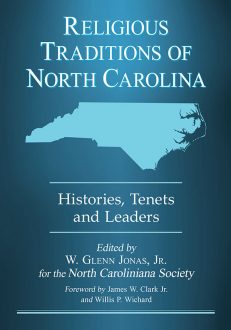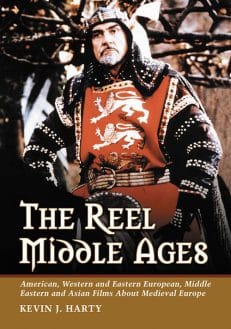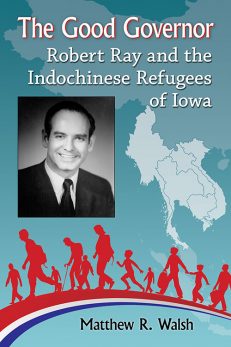Subtotal: $14.99
The Good Governor
Robert Ray and the Indochinese Refugees of Iowa
$29.95
In stock
About the Book
After the Americans withdrew from the Vietnam War, their Indochinese allies faced imprisonment, torture and death under communist regimes. The Tai Dam, an ethnic group from northern Vietnam, campaigned for sanctuary, writing letters to 30 U.S. governors in 1975. Only Robert D. Ray of Iowa agreed to help. Ray created an agency to relocate the Tai Dam, advocated for the greater admission of “boat people” fleeing Vietnam, launched a Cambodian relief program that generated $540,000, and lobbied for the Refugee Act of 1980. Interviews with 30+ refugees and officials inform this study, which also chronicles how the Tai Dam adapted to life in the Midwest and the Iowans’ divided response.
About the Author(s)
Bibliographic Details
Matthew R. Walsh
Format: softcover (6 x 9)
Pages: 244
Bibliographic Info: 25 photos, notes, bibliography, index
Copyright Date: 2017
pISBN: 978-1-4766-6947-2
eISBN: 978-1-4766-2888-2
Imprint: McFarland
Table of Contents
Acknowledgments vi
Preface 1
Introduction 5
1. Beginnings and Endings at Dien Bien Phu 19
2. Bending the Rules of Federal Refugee Policy 39
3. The Growing Pains of the Iowa Refugee Service Center 61
4. Tai Dam as Professional Refugees 83
5. The Boat People Come to Iowa 109
6. Iowa SHARES and the Cambodian Refugees 133
7. The Littlest Victims 150
8. Children as Cultural Go Betweens 170
9. Robert Ray and the Indochinese Refugees 189
Chapter Notes 213
References 227
Index 231
Book Reviews & Awards
- Winner, Benjamin F. Shambaugh Award—The State Historical Society of Iowa
- “Includes interviews with dozens of refugees and resettlement officials who paint a picture of struggle and resistance, but also of hope and promise…as we have witnessed over the generations, our rich national fabric is strengthened and enriched by the frequent incorporation of those fleeing oppression and hate and those looking for better opportunities for their families…uplifting…worthy.”—VVA Veteran
- “Decades ago, an Iowa politician confronted a human crisis abroad by welcoming refugees to this land…he didn’t do it because it was in his political interest or because it was popular. He did it because it was the right thing to do…stands as a testament to what enlightened leadership can do by meeting dire human need with a compassionate heart.”—Iowa History Journal
- “Ray had an instinct for doing the right thing…holds special meaning at a time when nations around the world are struggling to cope with displaced peoples…the resettlement model that benevolent nations worldwide look to today was developed in Iowa during the late 1970s…Walsh explains in detail through the eyes of everyday Iowans and the actual refugees…in the end the effort became a tremendous legacy.”—The Business Record (Des Moines, Iowa)
- “Weaving oral history with state records and broader historical literature into a first-rate yet accessible, short narrative, Matthew Walsh effectively makes the case for Robert Ray’s greatness and Iowa’s unique role in the settlement of Southeast Asian refugees.”—The Annals of Iowa
- “Traces the Indochinese refugee resettlement during Iowa Governor Robert Ray’s term in office”—ProtoView

 Religious Traditions of North Carolina
Religious Traditions of North Carolina 





